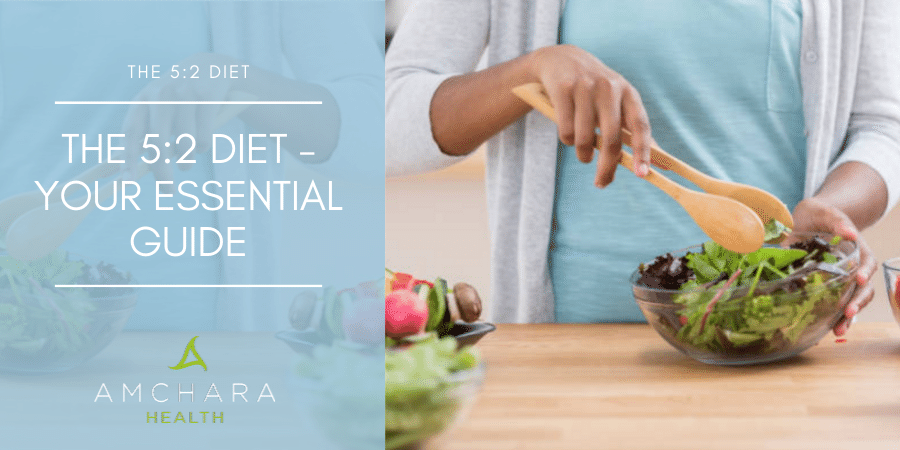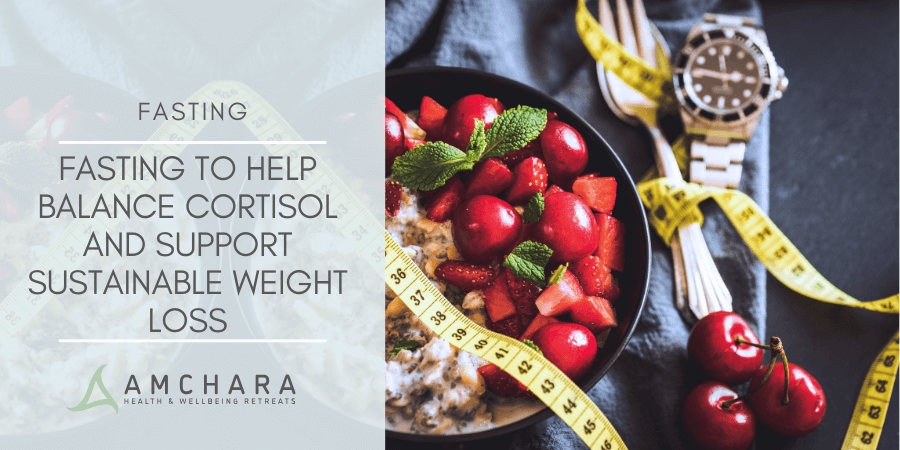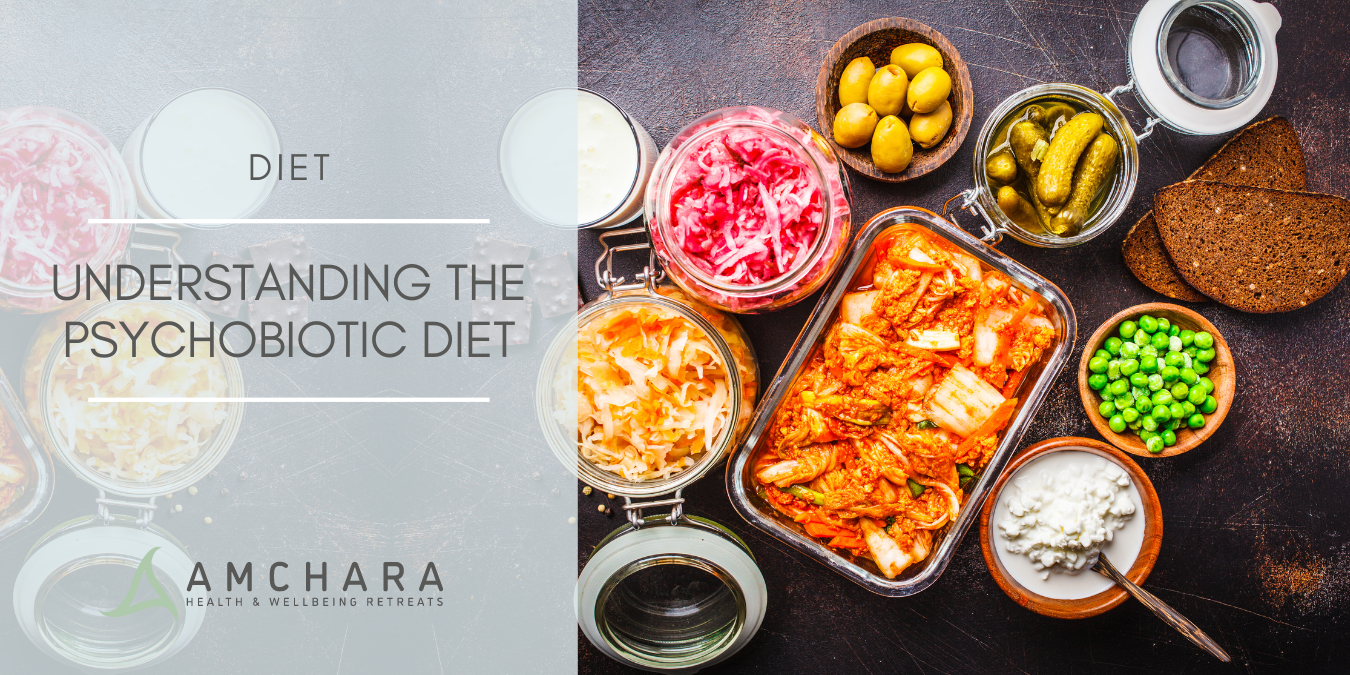The 5:2 diet – your essential guide.
In 2012 Dr Michael Mosley made a documentary for the BBC called “Eat, fast, live longer”.
It was during this documentary that the health benefits of the 5:2 diet were revealed.
The popularity of this type of eating plan continues and in this article, we discuss what it entails and why exactly it gives so many health benefits.
We aim to provide you with both insightful information and evidence-based content, all orientated towards the Personalised Health approach, with actionable knowledge and tips to help you on your journey to optimal health.
What does the 5:2 diet involve?
The 5:2 diet is also referred to as the ‘fast diet’ and is often cited as a form of intermittent fasting or modified alternate day fasting.
As food is eaten on the so-called “fasting days” it is not technically a fast.
A fast can be defined as abstaining from any food for a set period of time.
The 5:2 eating pattern can best be described as a form of calorie restriction.
The 5:2 diet involves eating a normal amount of calories on 5 days a week and restricting calorie intake to 25% of typical daily energy needs on the two remaining days – this equates to 600 calories a day for men and 500 calories a day for women.
The calorie restrictive days can be undertaken back to back, or split with a non-fast day or more in between – it is about finding what works for you (1).
There isn’t a focus on the types of foods to eat, much like diets such as Atkins, paleo, or keto, although it is suggested to refrain from overeating on ‘normal’ days and to observe healthy eating guidelines.
Restricting calories on two days a week and eating cake, crisps, takeaways and chocolate on the other 5 days is much less likely to bring health benefits.
Participants in the dietary trials reported not feeling the need to ‘binge eat’ on their ‘normal’ eating days and maintained a healthy calorie intake.
What are the health benefits of 5:2?
One of the health benefits that is often discussed is that of weight loss.
Studies comparing traditional calorie controlled diets (continuous energy restriction) and intermittent energy restriction, such as the 5:2, show that they both lead to significant weight loss, but the intermittent energy restriction diets are easier to stick to in the long term.
Other changes that occur include a reduction in a hormone called leptin (2), known as your satiety hormone and responsible for making you feel fuller. It is produced in fat cells and levels can be high in obesity.
This can lead to the body becoming ‘immune’ or ‘deaf’ to its effects and hunger is not switched off as it should be (3).
Reducing body weight and fat cells reduces leptin and allows the body cells to be more responsive to the effects of this hormone which can help to prevent overeating.
Insulin is a hormone produced by the pancreas and serves to move glucose out of the blood and into body cells to be used as energy.
When energy needs are met, insulin directs excess glucose into storage in fat cells.
Uncontrolled blood sugar and a lack of responsiveness to high levels of insulin (also called insulin resistance) are key factors in conditions such as diabetes and metabolic syndrome, both of which increase other health risks.
A 5:2 eating approach is known to keep blood sugar more regulated and improve insulin resistance (2).
Other markers that improve include HbA1c, this gives an indication of blood sugar control over a period of several weeks (4).
The balance between the types of cholesterol and fats like triglycerides in blood can have a significant impact upon cardiovascular health.
Imbalances can lead to heart attacks, stroke and atherosclerosis – a condition where fatty deposits and ‘plaques’ are seen in the walls of blood vessels.
This narrows the vessels and can impact blood pressure.
Restricting calorie intake on two days a week decreases total cholesterol, LDL cholesterol and triglycerides (5).
Reducing these can positively support healthy cardiovascular function.
It is suggested that having a blood pressure of 120/80 mmHg is ideal for cardiovascular health.
High blood pressure is seen in measurements above 140/90 mmHg. It is estimated that 25% of adults in the UK may have undiagnosed high blood pressure and it is often called the ‘silent killer’ as there can be no obvious symptoms for some people.
An increase in blood pressure is a major risk factor for stroke.
Not only does the 5:2 diet aid in blood fat balance but also helps to reduce blood pressure (2,5), thereby reducing the risk of stroke.
Inflammation is now known to be a major factor in many chronic diseases including obesity, heart disease, Type 2 diabetes and depression.
Inflammation is a natural immune response that is designed to help the body deal with injury, damage or infection from bacteria, viruses or yeasts.
Unfortunately, this process can be ‘switched on’ at a low level and become chronic, leading to health issues.
Testing for levels of inflammation can be done through a blood test for a marker called C-reactive protein (CRP), this is often high in cases of increased inflammation.
A high CRP is linked to heart attack, stroke and artery disease (6).
Studies indicate that restricting calories on two days of the week reduces CRP levels and inflammation (2).
In the BBC Horizon documentary first introducing the 5:2 diet, Michael Mosley met with Professor Valter Longo, a leading scientific expert on the subject of ageing.
Professor Longo has conducted many experiments on calorie restriction and its effect on ageing in animals.
He has demonstrated that animals have an increased lifespan when on a reduced calorie diet.
This effect is also seen when there is a reduction of protein in the diet (7).
This may be due to the reduction of a hormone called insulin-like growth factor 1 (IGF-1).
This has a similar structure to insulin, hence the name, and is responsible for growth, particularly in childhood.
Although IGF-1 has many roles in the body, high levels of IGF-1 is associated with an increased risk of developing certain cancers as it stimulates cell growth and proliferation and inhibits cell death (8).
What to do on calorie restrictive ‘fasting’ days
Keeping within your calorie ‘budget’ can be hard at first and planning ahead can make a huge difference.
Understanding calorie levels within foods is a great place to start.
There are many apps available that assist in calculating calorie intake.
You may wish to weigh foods and store in suitably sized containers so that you are aware of how many calories they contain.
There are no hard and fast rules as to when you should eat or even if you should split your calorie intake into 2-3 meals or have one large meal.
The key is to find what works for you. You may wish to have 3 small meals, much as you would on a normal eating day.
Calories could be split to 150 at breakfast and again at lunch and 200 in the evening.
Alternatively, you may find 2 meals a day suits you better and time them to have a ‘brunch’ of around 200 calories mid-morning and an evening meal of 300 calories.
For men an extra 100 calories as an extra snack may be of use, or simply share those calories out amongst meals.
What type of food you eat can make a difference to how you feel.
Make sure you include good source of protein and fibre as these will help keep you feeling fuller for longer and reduce cravings.
Good foods include:
- Eggs
- Vegetables
- Fish
- Lentils
- Beans
If you need extra inspiration on what to do with your calories this website may be of use.
Keeping your mind active is also helpful as you are more likely to want to snack or be tempted by food if you have nothing to do.
A ‘fasting’ day can be good on a work day, particularly if you have a high workload.
But if your job is very physical you may not want to restrict your calorie intake while at work and instead choose to do it on a more restful day.
Creative activities, mindfulness or gentle yoga can help the mind to focus on other things.
It seems the 5:2 diet brings many health benefits and is also an eating pattern that is sustainable in the long term.
If you are interested in other eating patterns that support optimal health, then take a look at our article on intermittent fasting.
Do you follow a 5:2 diet?
What health benefits have you experienced? How do you find the ‘fasting’ days?
What are your favourite recipes?
We love to hear about your own personal experiences and feel sharing information can help others to achieve optimal health.
Please feel free to comment below.
Read this next:





